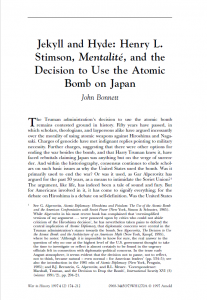Publications
Articles
Jekyll and Hyde
Henry L. Stimson, Mentalité, and the Decision to Use the Atomic Bomb.
War In History 4(2): 174-212.
Abstract: The Truman Administration's decision to use the atomic bomb continues to provoke controversy, and Henry Stimson's role and thought regarding the use of the bomb, as Secretary of War, remains a focal point of that controversy. Stimson's role in the use of the bomb became an issue in the wake of the publication of Gar Alperovitz' Atomic Diplomacy, a work in which a disturbing picture of Stimson emerged. Stimson's diaries played a key role in supporting Alperovitz' argument that the bombings were not necessary from a military standpoint, and that diplomatic concerns shaped the Truman administration's posture towards the bomb.
The purpose of this contribution is to argue that Alperovitz' argument, in a word, was wrong. Henry Stimson's thinking cannot be properly understood simply by reading his writings from 1944 and 1945 and reading them against the policy challenges that faced him. Rather, his writings must be read in relation to the opinions he expressed over the span of his life on questions such as morality, diplomacy and the conduct of war. Fortunately, scholars have access to the Stimson Diaries , a rich source documenting portions of Stimson’s life covering nearly 50 years. The collection includes not only Stimson’s personal entries but also portions of correspondence and memoranda that he either sent or received in his various administrative capacities in the United States government. This study will also be supplemented by evidence from Stimson’s colleagues interviewed by the Columbia Oral History Project.
It uses these sources to assess Stimson's opinions on war, diplomacy and morality, and finds that Stimson articulated remarkably consistent opinions on these topics over the span of his working life. It further uses them to interpret Stimson's thinking and motivations in the months leading up to Hiroshima and Nagasaki. And it finally uses Stimson diary entries to address a related issue: the charge that Stimson's post-war claims that the atomic bomb saved American lives were post-war fictions. This contribution will argue, by contrast, that the opinions articulated by Stimson in his post-war apologies were thoroughly consistent with the one's he expressed before the war.





